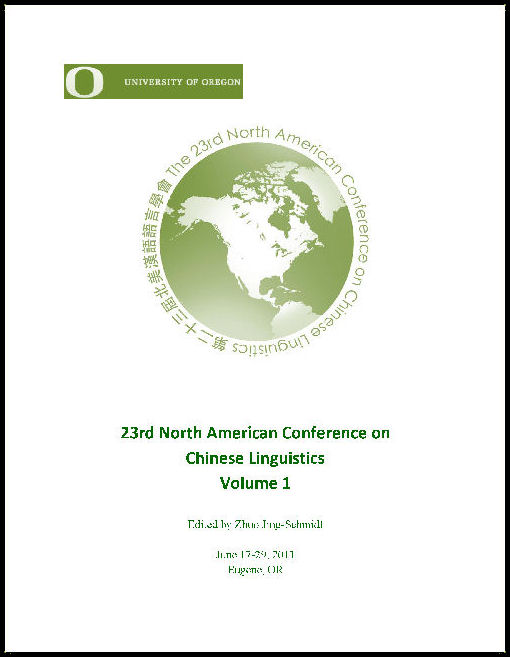NACCL Proceedings Online - NACCL-23 (2011)
Proceedings of the 23rd North American Conference on Chinese Linguistics (NACCL-23).
Edited by Zhuo Jing-Schmidt.
University of Oregon, Eugene, OR.
Distributed by NACCL Proceedings Online, The Ohio State University, Columbus, Ohio.
 |
The NACCL-23 Proceedings is available here in PDF format. (Note: Adobe Reader (formerly, Acrobat Reader) version 6.0 or higher is required. The full-text PDF files open in a new window.)
- Download the NACCL-23 Proceedings as two PDF files here:
Volume 1 (7.9 MB) -- Volume 2 (8.5 MB). - To download individual papers from the two volumes, see below.
Volume 1
- Cover for Volume 1
- Front pages for Volume 1 (pp. ii - vi)
(copyright page, table of contents for volume 1, preface, and acknowledgment) - Individual Papers
- Download the full-text PDF files below.
Volume 2
- Cover for Volume 2
- Front pages for Volume 2 (pp. ii - vi)
(copyright page, table of contents for volume 2, preface, and acknowledgment) - Individual Papers
- Download the full-text PDF files below.
Volume 1
Part I. Corpus Linguistics
- Tao Ming and Liang Chen (p. 1-17)
The ordering of multiple relative clauses modifying the same head NP in Chinese follows information-flow principles - Shan Wang, Sophia Lee and Chu-ren Huang (p. 18-34)
A corpus-based analysis of semantic type system of event nouns: a case study on huìyì - Wen Jin (p. 35-50)
A statistical argument for the homophone avoidance approach to the disyllabification of Chinese
Part II. Historical Linguistics
- Scott DeLancey (p. 51-64)
The origins of Sinitic - Jeeyoung Peck (p. 65-83)
Analogy and reanalysis in the postposing of durative and iterative adverbials in the history of Chinese
Part III. Phonetics and Phonology
- Shawn Yung-hsiang Chang (p. 84-96)
Distinction between Mandarin Tones 2 and 3 for L1 and L2 listeners - Ping Jiang and Aishu Chen (p. 97-109)
Representation of Mandarin intonations: boundary tone revisited - Yah-ting Shih and Eunjong Kong (p. 110-119)
Perception of Mandarin fricatives by native speakers of Taiwan Mandarin and Taiwanese - Ying-Shing Li (p. 120-137)
Investigating Taiwan Southern Min subsyllabic structure using maximum entropy models and wordlikeness judgments - Chiung-Yao Wang and Yen-Hwei Lin (p. 138-155)
Variation in Tone 3 Sandhi: the case of prepositions and pronouns - Seth Wiener (p. 156-172)
Grass-mud horses to victory: the phonological constraints of subversive puns - Seth Wiener and Ya-ting Shih (p. 173-190)
Divergent places of articulation: [w] and [ʋ] in modern spoken Mandarin
Part IV. Psycholinguistics
- Chien-Jer Charles Lin (p. 191-199)
Chinese and English relative clauses: processing constraints and typological consequences - Yowyu Lin (p. 200-214)
Locality versus anti-locality effects in Mandarin sentence comprehension - Yu-an Lu (p. 215-226)
The psychological reality of phonological representations: the case of Mandarin fricatives
Part V. Second Language Acquisition
- Ying Liu and Qian Du (p. 227-236)
Chinese as a Foreign Language (CFL) learners’ representation of voice in argumentative writing - Hongying Xu (p. 237-249)
The acquisition of some properties of the BA construction by English-speaking learners of Chinese - Jin Zhang (p. 250-261)
L2 acquisition of Chinese locative inversion
Volume 2
Part I. Semantics and Pragmatics
- I-Hsuan Chen (p. 1-14)
The semantic constraints on the VERB + zhĕ nouns in Mandarin Chinese - Noah Constant (p. 15-29)
On the independence of the Mandarin aspectual and contrastive sentence-final ne - Chao Li (p. 30-47)
Postverbal constituents in Mandarin Chinese - Yi-Hsien Liu (p. 48-65)
Topic-comment and the Chinese existential construction - Lyih-Peir Luo (p. 66-81)
An aspectual approach to the postverbal locative zai-phrase - Tianqi Yang (p. 82-92)
Non-literal use of "jade": a study on "玉" (yu) in Chinese idioms
Part II. Sociolinguistics and Socio-pragmatics
- Litong Chen (p. 93-104)
The imposition of Cantonese on Mandarin in the city of Guangzhou - Si Chen and Caroline Wiltshire (p. 105-122)
Differences of tone representation between younger and older speakers of Nanjing dialect - Meihsing Kuo (p. 123-132)
Children in arguments with peers: young children’s strategies as opposer and opposee - Woan-Tyng Lee (p. 133-150)
Ideology in address forms — a case study of two political talk shows in Taiwan
Part III. Studies on Regional Varieties of Chinese
- Yuchau Hsiao (p. 151-163)
Cross-anchoring of tones in Hoiliuk triplication - Yenchun Lin (p. 164-174)
Superlatives in Taiwanese - Xinyuan Shi (p. 175-189)
Neutralization of T3 and T5 sandhi in Suzhou Chinese - Yutian Tan (p. 190-207)
The origin and nature of high rising diminutive tone change in Siyi dialect - Hui-ling Yang (p. 208-223)
Is Chinese a negative concord language?
Part IV. Syntax
- Hsu-Te Cheng (p. 224-240)
Argument ellipsis in Mandarin Chinese - Chen-chun E (p. 241-257)
The YUE-construction in Mandarin Chinese - Qian Gao (p. 258-265)
Passives and anti-passives in Chinese: a pedagogical consideration - Qiaona Yu (p. 266-278)
Rule conspiracy in Chinese time expressions
Part V. Translation Study on Buddhist Sutras
- Shu-Fen Chen and Bernard Montoneri (p. 279-295)
A study of some punctuation errors found in the Taisho and CBETA Diamond Sutra based on Sanskrit-Chinese comparative studies
